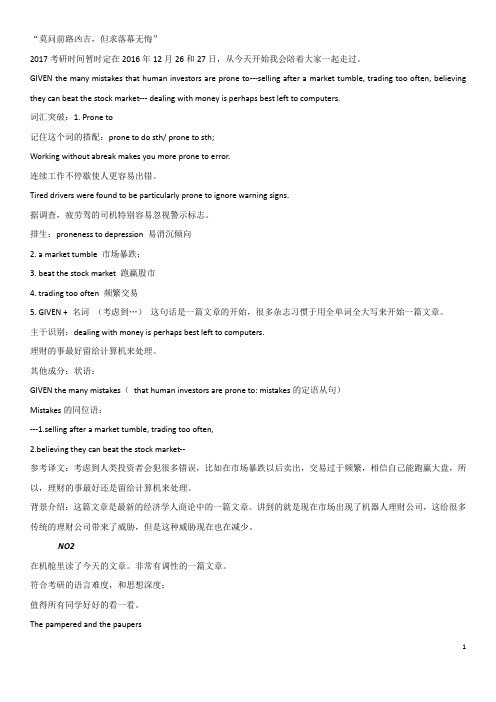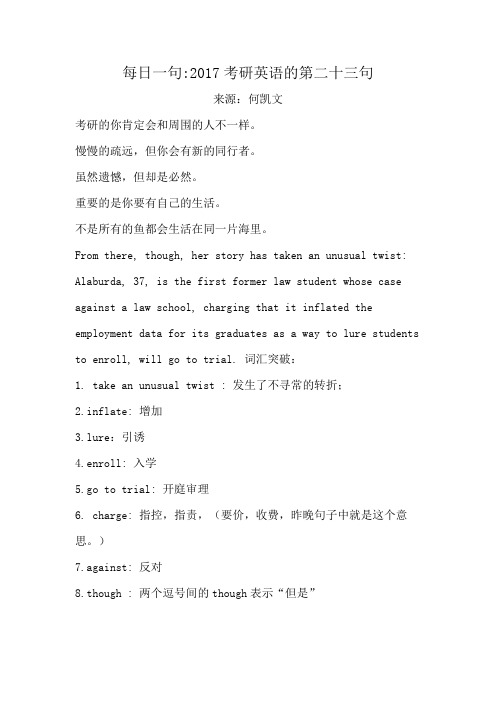何凯文2017考研英语每日一句234-242
【何凯文】考研英语每日一句(4.20-5.09)

4月20日我们认为只有人才会笑,但是研究表明猴子也会,鹦鹉也会,甚至连老鼠也会。
We usually think laughter is primarily something we do when we find something funny,but in fact most laughter is produced for social reasons–we are30times more likely to laugh if there is someone else with us than when we are on our own.(想想你会怎么出题?)思考题:The conventional wisdom is that the laughter is the product of social interaction.来看看单词:ughter笑2.conventional wisdom传统的看法参考译文:我们通常认为,笑是我们发现一些有趣的东西时主要做的事,但实际上大多数的笑声是出于社会原因。
如果有别人和我们在一起时,我们笑的可能性是我们独处时的30倍。
来看看思考题:The conventional wisdom is that the laughter is the product of social interaction.传统的观点不是这样认为的,所以这个思考题是不对的。
4月21日The District plans to crack down on drivers who park in or block bike lanes and put cyclists at risk by creating a team of bike-lane enforcement officers with the power to issue tickets on the scene and by mail.思考题一:The drivers create a team to put cyclists at risk.来看看单词:1.crack down on严惩,整治2.park停车3.block阻塞4.cyclist骑车人5.enforcement officers执法人员6.issue tickets开罚单参考译文:华盛顿特区计划组建一支有权力以现场和邮寄的方式发放罚单的自行车道执法力量,对那些在自行车道上停车或阻塞自行车道,并将骑车人置于危险之中的司机采取严厉措施。
2017年全国硕士研究生入学统一考试英语(二)试题答案详解 .doc

2017年全国硕士研究生入学统一考试英语(二)试题答案详解(完整版)注意:英语试卷为花卷,以答案内容进行核对万学海文教研中心英语教研室Section I Use of English1、【答案】[C] warning【解析】此处考察词义辨析。
首句说:人们几个世纪以来一直在思索没有工作的未来。
该句含义为:现在也是如此,学者们再次_______技术正在取代人类劳动。
从句为负向,故首先排除boasting吹嘘,ensuring确保。
Denying否认与首句中心句相冲突,故答案为Warning警告,语义逻辑通顺。
2、【答案】[A] inequality【解析】此处考察词义辨析。
该句含义为:“一些人认为即将来临的不用工作的世界通过______来定义。
少数的富人拥有所有的财富,而大多数人则在一片贫穷的荒芜之地中挣扎着生存。
”后一句话为对前一句的解释,所以这是一个不平等的世界,选inequality。
3、【答案】[D] prediction【解析】此处考察词义辨析。
该句含义为:一个不同的,而并不相互排斥的_______认为未来将成为一面不同类别的荒芜之地。
此处,prediction(语言)呼应了文中future (未来),为最佳选项,且代入原文语义通顺。
Policy政策,guideline指导方针,resolution 决心,在此处都不符合题意。
4、【答案】[A] characterized【解析】此处考察词义辨析。
前文说一种与众不同的荒芜之地,one为同位语补充说明荒地特征。
该句含义为:未来将成为一面不同类别的荒芜之地,一个以漫无目的性________的荒芜之地。
Be characterized by以……为特征,此处purposelessness(漫无目的)的确是一种特征,故该选项为正确答案。
Divide分割,measure测量,balance 平衡,均语义不通。
5、【答案】[B] meaning【解析】此处考察词义辨析及词义复现。
何凯文2017每日一句

“莫问前路凶吉,但求落幕无悔”2017考研时间暂时定在2016年12月26和27日,从今天开始我会陪着大家一起走过。
GIVEN the many mistakes that human investors are prone to---sellingafter a market tumble, trading too often, believing they can beat the stockmarket--- dealing with money is perhaps best left to computers.词汇突破:1. Proneto记住这个词的搭配:proneto do sth/ prone to sth;Working without abreak makes you more prone to error.连续工作不停歇使人更容易出错。
Tired drivers werefound to be particularly prone to ignore warning signs.据调查,疲劳驾的司机特别容易忽视警示标志。
排生:proneness to depression 易消沉倾向2. a market tumble 市场暴跌;3. beat the stockmarket 跑赢股市4. trading toooften 频繁交易5. GIVEN + 名词(考虑到…)这句话是一篇文章的开始,很多杂志习惯于用全单词全大写来开始一篇文章。
主干识别:dealingwith money is perhaps best left to computers.理财的事最好留给计算机来处理。
其他成分:状语:GIVEN the many mistakes(that humaninvestors are prone to: mistakes的定语从句)Mistakes的同位语:---1.selling after a market tumble, trading too often,2.believing theycan beat the stock market--参考译文:考虑到人类投资者会犯很多错误,比如在市场暴跌以后卖出,交易过于频繁,相信自己能跑赢大盘,所以,理财的事最好还是留给计算机来处理。
何凯文每日一句.更新至10月15日

207今天再来两个非常经典的翻译句子,之在翻译的技巧上再次强调切分转化换词性,适当的在独立成句后加上关联词。
第一个句子:The entrance of the sciences into the circle of liberal studies also metpowerful opposition.这个句子的切分点就是:The entrance of the sciences into the circle of liberal studies这个部分中的entrance可以翻译为动词;科学(学科)进入人文学科领域(的时候),2. /also met powerful opposition.也遇到了强烈的抵制。
第二个句子:Naturally, scientific studies were opposed on the ground that they were anti-religious in their effect, the breeders of atheism, and the destroyers of faith.切分:Naturally, scientific studies were opposed /on the ground that /theywere anti-religious in their effect, the breeders of atheism, and thedestroyers of faith.其中:anti-religiousbreedersdestroyers这三个词可以转译为动词;这样句子可以这样翻译:(你们可以自己先翻译一下)很自然,科学研究受到了反对,理由是这些研究实际上反对宗教,催生无神论,破坏信仰。
昨天句子的解析:“The recovery from the Great Recession has advanced sufficiently far anddomestic spending has been sufficiently robust that an argument can be made for a rise in interest rates at this time,”Ms. Yellen said. But “heighteneduncertainness abroad”and slow inflation persuaded the committee to wait for more evidence,including continued job growth, “to bolster its confidence.”why the Fed still keepinterest rates near zero?(A) The recovery from thefinancial crisis is not as good as expected.(B) The threat of foreigncompetition threatens the job growth.(C) The Fed is still dearthof confidence in oversea market.(D) The heightened uncertainness abroad bolsters its confidence.我先不分析,你们就先看看译文吧!如果看完译文就枉然大悟那就是单词和句子的问题!!!最佳答案只能是C!国庆5天课就是要继续夯实基础!只有回归基础才能看到进步啊!这个时候急躁不得参考译文:耶伦说,“自大衰退以来,美国经济已经出现大幅复苏,国内消费也变得足够强劲,这为上调利率提供了支持”。
2017考研英语二完型填空来源及浅析

2017考研英语二完型填空来源及浅析Dculture. “We think it’s bad to just sit around with nothing to do,” says Everett. “For the Pirahã, it’s quite a desirable state.”Gray likens these aspects of the hunter-gatherer lifestyle to the carefree adventures of many children in developed countries, who at some point in life are expected to put away childish th ings. But that hasn’t always been the case. According to Gary Cross’s 1990 book A Social History of Leisure Since 1600, free time in the U.S. looked quite different before the 18th and 19th centuries. Farmers—which was a fair way to describe a huge number of Americans at that time—mixed work and play in their daily lives. There were no managers or overseers, so they would switch fluidly between working, taking breaks, joining in neighborhood games, playing pranks, and spending time with family and friends. Not to mention festivals and other gatherings: France, for instance, had 84 holidays a year in 1700, and weather kept them from farming another 80 or so days a year.This all changed, writes Cross, during the Industrial Revolution, which replaced farms with factories and farmers with employees. Factory owners created a more rigidly scheduled environment that clearly divided work from play. Meanwhile, clocks—which were becoming widespread at that time—began to give life a quicker pace, and religious leaders, who traditionally endorsed most festivities, started associating leisure with sin and tried to replace rowdy festivals with sermons.As workers started moving into cities, families no longer spent their days together on the farm. Instead, men worked in factories, women stayed home or worked in factories, and children went to school, stayed home, or worked in factories too. During the workday, families became physically separated, which affected the way people entertained themselves: Adults stopped playing “childish” games and sports, and the streets were mostly wiped clean of fun, as middle- and upper-class families found working-class activities like cockfighting and dice games distasteful. Many such diversions were soon outlawed.With workers’ old outlets for play having disappeared in a haze of factory smoke, many of them turned to new, more urban ones. Bars became a refuge where tired workers drank and watched live shows with singing and dancing. If free time means beer and TV to a lot of Americans, this might be why.At times, developed societies have, for a privileged few, produced lifestyles that were nearly as play-filled as hunter-gatherers’. Throughout history, aristocrats who earned their income simply byowning land spent only a tiny portion of their time minding financial exigencies. According to Randolph Trumbach, a professor of history at Baruch College, 18th-century English aristocrats spent their days visiting friends, eating elaborate meals, hosting salons, hunting, writing letters, fishing, and going to church. They also spent a good deal of time participating in politics, without pay. Their children would learn to dance, play instruments, speak foreign languages, and read Latin. Russian nobles frequently became intellectuals, writers, and ar tists. “As a 17th-century aristocrat said, ‘We sit down to eat and rise up to play, for what is a gentleman but his pleasure?’” Trumbach says.It’s unlikely that a world without work would be abundant enough to provide everyone with such lavish lifestyles. But Gray insists that injecting any amount of additional play into people’s lives would be a good thing, because, contrary to that 17th-century aristocrat, play is about more than pleasure. Through play, Gray says, children (as well as adults) learn how to strategize, create new mental connections, express their creativity, cooperate, overcome narcissism, and get along with other people. “Male mammals typically have difficulty living in close proximity to each other,” he says, and play’s harmony-promoting properties may explain why it came to be so central to hunter-gatherer societies. While most of today’s adults may have forgotten how to play, Gray doesn’t believe it’s an unrecoverable skill: It’s not uncommon, he says, for grandparents to re-learn the concept of play after spending time with their young grandchildren.When people ponder the nature of a world without work, they often transpose present-day assumptions about labor and leisure onto a future where they might no longer apply; if automation does end up rendering a good portion of human labor unnecessary, such a society might exist on completely different terms than societies do today.So what might a work-free U.S. look like? Gray has some ideas. School, for one thing, would be very different. “I think our system of schooling would completely fall by the wayside,” says Gray. “The primary purpose of the educational system is to teach people to work. I don’t think anybody would want to put our kids through what we put our kids through now.” Instead,Gray suggests that teachers could build lessons around what students are most curious about. Or, perhaps, formal schooling would disappear altogether.Trumbach, meanwhile, wonders if schooling would become more about teaching children to be leaders, rather than workers, through subjects like philosophy and rhetoric. He also thinks that people might participate in political and public life more, like aristocrats of yore. “Ifgreater numbers of people were using their leisure to run the country, that would g ive people a sense of purpose,” says Trumbach.Social life might look a lot different too. Since the Industrial Revolution, mothers, fathers, and children have spent most of their waking hours apart. In a work-free world, people of different ages might come together again. “We would become much less isolated from each other,” Gray imagines, perhaps a little optimistically. “When a mom is having a baby, everybody in the neighborhood would want to help that mom.” Researchers have found that having close relationships is the number-one predictor of happiness, and the social connections that a work-free world might enable could well displace the aimlessness that so many futurists predict.In general, without work, Gray thinks people would be more likely to pursue their passions, get involved in the arts, and visit friends. Perhaps leisure would cease to be about unwinding after a period of hard work, and would instead become a more colorful, varied thing. “We wouldn’t have to be as self-or iented as we think we have to be now,” he says. “I believe we would become more human.”。
每日一句:2017考研英语的第二十三句

每日一句:2017考研英语的第二十三句来源:何凯文考研的你肯定会和周围的人不一样。
慢慢的疏远,但你会有新的同行者。
虽然遗憾,但却是必然。
重要的是你要有自己的生活。
不是所有的鱼都会生活在同一片海里。
From there, though, her story has taken an unusual twist: Alaburda, 37, is the first former law student whose case against a law school, charging that it inflated the employment data for its graduates as a way to lure students to enroll, will go to trial. 词汇突破:1. take an unusual twist : 发生了不寻常的转折;2.inflate: 增加3.lure:引诱4.enroll: 入学5.go to trial: 开庭审理6. charge: 指控,指责,(要价,收费,昨晚句子中就是这个意思。
)7.against: 反对8.though : 两个逗号间的though表示“但是”主干识别:Her story has taken an unusual twist. 她的故事发生了不同寻常的转折。
切分: 1. Alaburda, 37, is the first former law student2. whose case against a law school will go to trial独立成句:Alaburda’s case (against a law school 定语修饰case) will go to trial.3. charging that it inflated the employment data for its graduates as a way to lure students to enroll. charge 的动作发出者是:Alburda ,独立成句为:Alburda charges that it inflated the employment data for its graduates as a way to lure students to enroll.这样这个句子就是“主句+1+2+3”再按中文的习惯调序。
2017年全国硕士研究生入学统一考试英语(二)真题及解析

2017年全国硕士研究生入学统一考试英语(二)真题及解析(江南博哥)材料题根据下面资料,回答1-20题People have speculated for centuries about a future without work. Today is no different, with academics, writers, and activists once again1that technology is replacing human workers. Some imagine that the coming work-free world will be defined by2.A few wealthy people will own all the capital, and the masses will struggle in an impoverished wasteland.A different and not mutually exclusive3holds that the future will be a wasteland of a different sort, one4by purposelessness: Without jobs to give their lives5, people will simply become lazy and depressed.6, today's unemployed don't seem to be having a great time. One Gallup poll found that 20 percent of Americans who have been unemployed for at least a year report having depression, double the ratefor7Americans. Also, some research suggests that the8for rising rates of mortality, mental-health problems, and addicting9poorly-educated, middle-aged people is a shortage of well-paid jobs. Perhaps this is why many10the agonizing dullness of a jobless future.But it doesn't11follow from findings like these that a world without work would be filled with unease. Such visions are based on the12of being unemployed in a society built on the concept of employment. In the13of work, a society designed with other ends in mind could14strikingly different circumstances for the future of labor andleisure. Today, the15of work may be a bit overblown. "Many jobs are boring, degrading, unhealthy, and a waste of human potential, " says John Danaher, a lecturer at the National University of Ireland in Galway.These days, because leisure time is relatively16for most workers, people use their free time to counterbalance the intellectual and emotional17of their jobs. "When I come home from a hard day's work, I often feel18," Danaher says, adding, "In a world in which I don't have to work,I might feel rather different"—perhaps different enough to throw himself19a hobby or a passion project with the intensity usually reserved for20matters.1、[单选题]第(1)题选_______.A.boastingB.denyingC.warningD.ensuring正确答案:C参考解析:文章首句说,几个世纪以来,人们一直都在推测未来将没有工作。
何凯文老师:考研英语_每日一句(1-50句)

2014考研英语第一句BlackBerrys, it is true, still have lots of enthusiastic followers. Commuters and corporate road warriors needing to keep in touch with colleagues and clients swear by them, as well as into them and at them.词汇点拨:BlackBerrys 黑莓手机(一种手机品牌)Commuters 上下班的人(通常距离比较远的人)(通勤者)n. (远距离)上下班往返的人corporate road warriors 公司中经常出差的人swear by 信赖swear into 使用(语境理解的,没有这个固定短语,估计是作者自创的)swear at 咒骂(固定短语)主干识别:今天其实是两个句子。
第一句的主干很简单:BlackBerrys still have lots of enthusiastic followers.第二个句子的主干是:Commuters and corporate road warriors swear by them, as well as into them and at them. (them指代黑莓手机)其他成分:第一句:it is true主谓结构做插入语;同时省略了that ;it is true that...第二句:needing to keep in touch with colleagues and clients 定语修饰前面的两种人。
(这里有歧义,可能修饰两种人,也可能修饰第二种人,通过句子无法判断,考试是不会成为考点的)难点点拨:主语和谓语之间的隔离问题是句子的难点;只要注意了句子主干的把握这个句子应该比较好理解,同时单词的具体含义是需要在语境中理解的。
